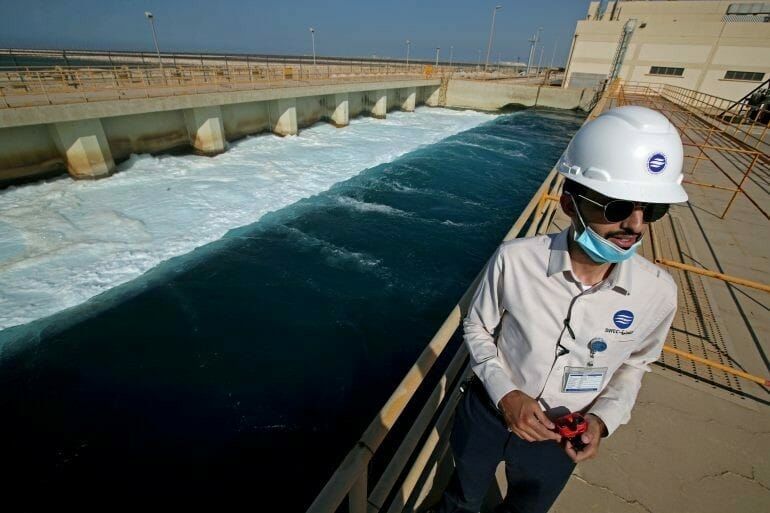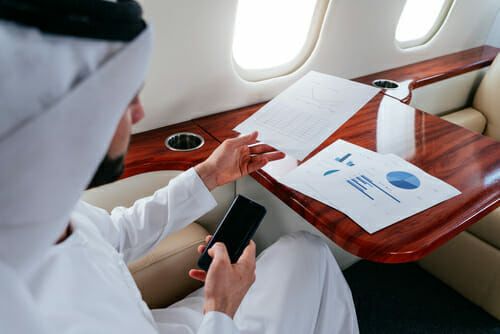
Saudi’s privatization plans ongoing despite hiccup
In a statement, the cabinet said the plan includes 100 potential initiatives in 16 different sectors, including ports, education, health, energy, water, agriculture, and communication, according to the Saudi state news agency (SPA).
In 2018, the Council of Economic and Development Affairs approved a privatization program designed to meet the goals of Vision 2030 under which the kingdom offered state assets with a value of $9.3-$10.7 billion for sale.
In 2020, the kingdom registered a deficit of $79.5 bn from revenues of $205.5 bn and expenditures reaching $285 bn.
Saudi Arabia’s 2021 budget is also expected to reach a deficit of $38 bn as it expects to spend $264 bn while revenues are expected to reach $226 bn.
Finance Minister Mohammed Al-Jadaan said he expects to raise $38 billion through asset sales and $16.5 billion through public-private partnerships, he told the Financial Times.
The Saudi government has identified 160 projects in 16 sectors, including asset sales and public-private partnerships through 2025.
Asset sales will include government-owned hotels, television broadcasting towers, and cooling and water desalination plants. The plan does not include Public Investment Fund entities or the sale of other assets of Saudi Aramco.
Latest privatization setback
Saudi has halted the sale of one of the world’s biggest water plants, which had attracted interest from investors including France’s Engie SA, in a setback in the kingdom’s privatization plans.
The Ras Al Khair desalination and power facility on Saudi’s east coast had cost more than $7bn to build.

Saudi Arabia was looking to raise about $2 billion by selling a 60% stake, sources told Bloomberg.
Potential bidders considered the plant’s age and use of outdated technology unappealing, the sources said.
“One of the main reasons for the cancellation of Ras Al Khair was the economic conditions resulting from the pandemic and its effect on transactions of this size,” a spokesman for the country’s National Centre for Privatization said recently.
He said that officials will continue with other public-private partnerships.
The Ras Al Khair sale has been in the works since at least 2017 when BNP Paribas was appointed as financial adviser.
Saudi is the world’s biggest consumer of desalinated water.
The plant serves the capital of Riyadh and the eastern parts of the kingdom. It produces 1.05 million cubic meters of desalinated water per day and 2.65 gigawatts of power.
Privatization of water networks
Last July, the Ministry of Environment, Water and Agriculture (MEWA) has launched the latest phase of its restructuring of regional water facilities under the umbrella of the National Water Co. (NWC), as part of the Kingdom’s wider privatization strategy.
Abdul Rahman Al-Fadli, minister of environment, water and agriculture, recently launched the integration of the Western Cluster, around the Makkah region, and the Southern Cluster, consisting of the Asir, Jazan, Najran, and Al-Baha regions.
The two clusters are part of plans for all 13 regions in the Kingdom to be integrated into six clusters, which will then operate under centralized management.

The NWC said in a press statement that the cluster integration process was organized to prepare the industry for private sector investment “in order to increase the efficiency of operational processes, redress technical gaps, and localize technology and technical expertise.”
The National Privatization Center in March also announced the creation of the Registry of Privatization Projects, a comprehensive central database of information and documents related to projects targeted for privatization.
Privatization of flour mills
Saudi has raised almost $800 million from the sale of two major flour mills as part of its privatization program.
The National Center for Privatization and PPP (NCP) and the Saudi Grains Organization (SAGO) completed the sale of both the Second and Fourth milling companies to qualified strategic investors, SAGO said in a filing.
A consortium comprised of Abdulaziz AlAjlan Sons Co. for Commercial and Real Estate Investments, Sulaiman Abdulaziz AlRajhi International Co., NADEC, and Olam International Limited has acquired the Second Milling Company for $570 mn.
Meanwhile, the Fourth Milling Company was sold to a consortium of Allana International, Abdullah Al Othaim Markets, and United Feed Manufacturing Company for $232 mn.
Saudi Ports Authority private investment plans
Saudi Ports Authority (MAWANI) has announced investment opportunities for the private sector to develop and operate multi-purpose terminals in eight Saudi ports.
The move is being carried out by MAWANI’s supervisory committee for privatization in the transport sector and in cooperation with the Ministry of Transport and Logistic Services (MOTLS) and the National Center for Privatization & PPP (NCP).
The promising opportunities are represented in build-operate-transfer (BOT) structure for terminals in each of Jeddah Islamic Port, King Abdulaziz Port in Dammam, Ras Al-Khair Port, Jizan Port, Yanbu Commercial Port, King Fahad Industrial Port in Jubail, King Fahad Industrial Port in Yanbu, and Jubail Commercial Port. They include equipping the ports to serve various functions including containers, general cargo, bulk cargo, roll-on roll-off (RORO) cargo, passengers, and livestock.
The initiative is part of the plan to optimize the utilization of assets and increase operational efficiency in this vital sector.
Chinese interest in Saudi privatization projects
The Chairman of Saudi-Chinese Business Council at the Federation of Saudi Chambers Mohamed Bin Abdulaziz Al-Ajlan has said that Chinese companies have expressed interest in investing in Saudi and taking part in privatization projects in various government sectors.
He added that this is in addition to investing in infrastructure projects.
Saudi Arabia had announced plans to privatize 16 government sectors and increase the contribution of the private sector to the GDP from 40% to 65%.